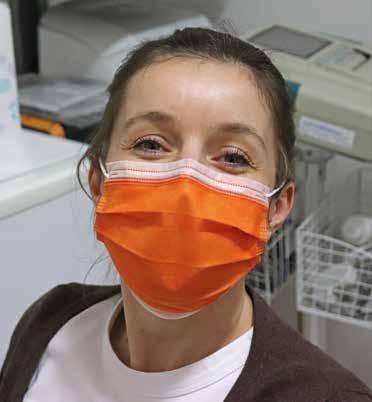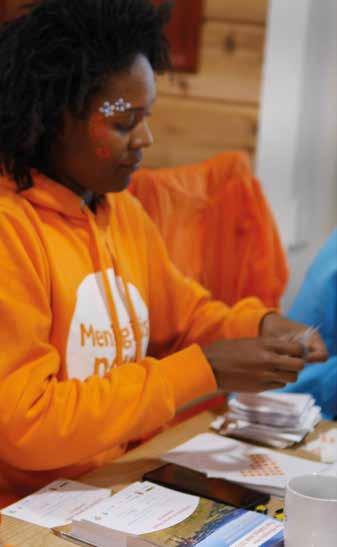
3 minute read
Finance, staff and infrastructure
Lockdown, followed by sustained periods of social distancing, had a significant impact on our ability to raise funds. Total income (including gifts-in-kind) was down by 20% to £2.2m in the year. The pandemic particularly disrupted our programme of fundraising events, as well as community fundraising, although this was partially offset by securing emergency grant funding and through the use of the Government’s Job Retention Scheme. With sustainability being paramount, we took decisions to reduce our expenditure to protect frontline support and the future of the charity, in line with the Coronavirus Strategy outlined on page 7. This included withdrawing partially from new scientific and medical research, spending less on printed awareness activities, delaying infrastructure projects and undertaking a staff restructure to reduce headcount significantly, by 39%. Total expenditure decreased by 32.1% on the previous year to £2.1m. Our action on expenditure enabled us to continue to target about 71% of our total spend on our charitable activities. However, this was partly achieved by diverting budget originally planned for research to frontline support services. Our total level of funding commitment to research remained similar to the prior year. We had hoped to progress three new projects but, in light of the impact of Covid-19, we were only able to commit fully to funding one. We reduced our total cost of raising funds by 29% on the prior year and maintained the proportion of total spend on raising funds to approximately 29%. There was a gain of £91k in the year on the investment which was originally made in April 2016 in a portfolio fund of Sarasin & Partners LLP. The original investment was £500k, and as at 31st March 2021, the value was £710k, an increase of £111k in the year. With the prompt action taken on expenditure, accessing emergency grant funding, utilising the Government’s Job Retention Scheme, and with the gain on investment, we achieved a surplus of £245k. Cash and investments at the end of the year stood at £2,306k, £370k higher than the prior year. The unrestricted reserves stood at £1,454k. This level of reserves means that the charity remains stable and sustainable into 2021-22, with the budget for that year projecting a deficit of approximately £500k. This planned deficit allows us to maintain and invest in our charitable activities whilst the impact of Covid-19 continues to create uncertainty and to affect income. Our Trading Subsidiary Meningitis Now’s wholly owned trading subsidiary, Meningitis Trust Trading Limited, passes its profits to Meningitis Now through Gift Aid. The income in 2020-21 was from the sale of Christmas Cards and the partnership with Waitrose and Caroline Gardner for the sale of jute bags.

With Covid-19 significantly disrupting our day-to-day activities, including our ability to raise funds, we made use of the Government’s Coronavirus Job Retention Scheme from April 2020. A core staff of 16 people were retained to keep our essential services running, whilst some 70% of staff were ‘furloughed’ in April. Over the course of the next seven months, many staff were brought back either full-time or on ‘flexible’ furlough, and the scheme proved a lifeline for both individuals and the charity overall. Sadly, the scheme did not obviate the need for the charity to make significant long-term reductions in expenditure, and in autumn 2020 a planned restructure was undertaken as part of the Coronavirus Strategy. Staff were fully engaged via a collective consultation process in the summer of 2020, and the new structure (which included the return of nearly all staff from furlough) took effect from 1st November 2020. This meant that our staffing establishment reduced from 59 to 36 heads over 2020-21, or 49 to 29 Full Time Equivalent (FTE) staff. Given these challenges, we chose not to operate our ‘Making Meningitis Now a Great Place to Work’ staff surveys. However, significant effort was deployed during the year to ensure that staff health and wellbeing was maintained, including dedicated wellbeing sessions and ‘check ins’ for staff, enhanced support via Simply Health (the charity’s Employee Assistance Programme) and the successful deployment of policies and equipment to enable all staff to work from home.
In line with government guidance, the charity’s head office, Fern House, was closed for all but essential activities during lockdown. Covid-secure measures (based on regular risk assessments) were also deployed, ensuring that staff could make safe use of the office once permitted to do so.









